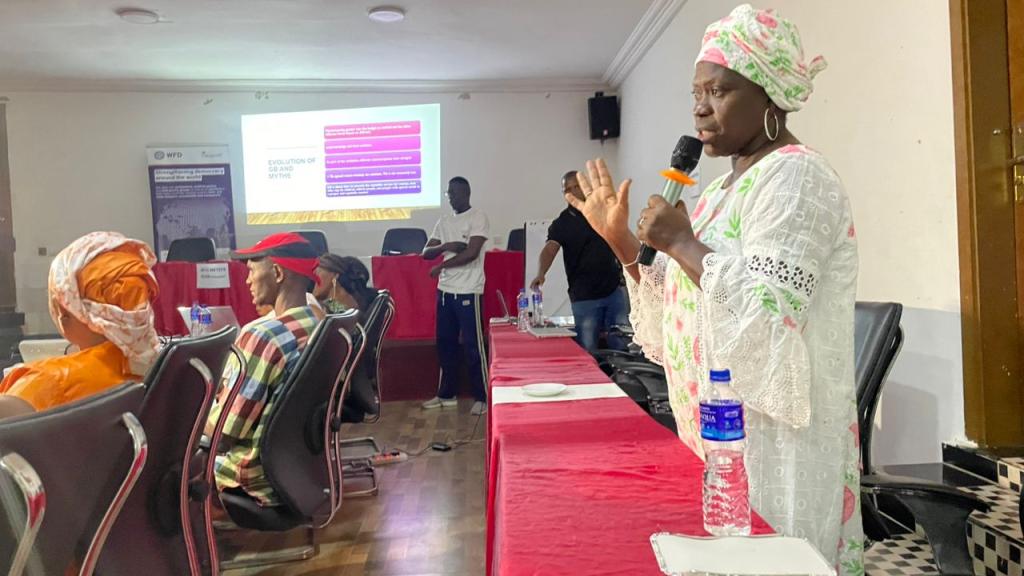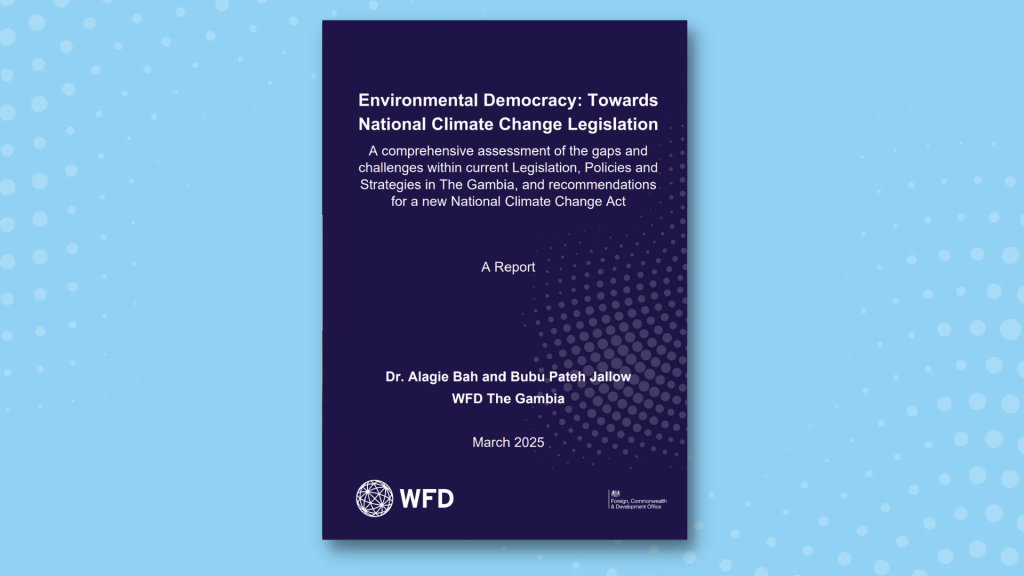Call for consultants: Research on the cost of politics in The Gambia

Introduction
In The Gambia, women represent more than half of the population (50.5%) and comprise 57% of all voters. While women and other marginalised groups are active in political spaces, their influence within formal governance structures and political parties remains limited. As an example of the prevailing gender imbalance, only three out of 22 ministerial positions and five out of 58 parliamentary seats are held by women.
Along with socio-cultural barriers, the cost of politics, which has been increasing steadily over the past electoral cycles in The Gambia, creates a barrier for women, youth, and other economically marginalised Gambians to participate in the electoral processes as candidates. WFD is seeking a consultant/team of consultants to strengthen understandings of the drivers and impacts of cost of politics that can inform recommendations which capture the unique challenges faced by women.
The “cost of politics” approach focuses on the spending of individuals contesting for political office rather than those of political parties. It is broad in its scope, aiming to cover expenditures incurred across the election cycle: following the money spent, from the candidates' decision to stand for political office at the party primary phase, to the end of an individual's elected tenure.
The approach attempts to better understand what factors drive individual choices when it comes to spending funds on politics. In doing so, it can help explain why there is a divergence between stated rules and regulations and their implementation or lack thereof and provide a clearer indication of the obstacles to regulating and curbing, or better monitoring, spending on political campaigns. It also seeks to understand the impacts and implications this has on the wider functioning of democracy.
This study in The Gambia would build on existing studies conducted across Africa, Eastern Europe, Asia and Latin America since 2016, including a study done in The Gambia in 2020. All of which are available on www.costofpolitics.net.
Objective
To conduct comprehensive research and analysis of the current cost of seeking and holding political office from a gender perspective in The Gambia, to consult and engage with relevant stakeholders to investigate how cost of politics for women impacts their chances of representation, leadership, and/or decision making in governance structures. While the predominant focus of the study is how the cost of politics affects women, attention should also be paid to how the system affects other marginalised groups such as persons with disabilities and how these intersectional identities compound disadvantage. Furthermore, to work with different stakeholders to discuss and propose how regulating the cost of politics can contribute to the improvement of women’s representation in governance.
It is envisaged that the study will be used to deepen the understanding of electoral incentives; stimulate national dialogue; inform legal and policy advocacy, particularly political party and electoral reform processes; and improve democratic processes, particularly for women, ahead of future polls.
The following key questions will underpin this research:
a) What are the key social, economic, and political drivers of the cost of parliamentary/legislative politics?
b) What are some of the types of costs incurred by prospective aspirants? And how does this differ depending on who they are or which political party they seek to contest with?
c.) How did the cost of politics differ between recent elections in terms of campaign financing, political spending, and election-related expenses?
d) How do the cost of politics impact on the participation of marginalised and special interest groups, particularly women, in electoral politics?
e) How do the cost of politics impact on the socio-economic development of the country?
f) What are the legal, policy and programming options likely to reduce or regulate the cost of politics?
Suggested methodology
The research should be conducted using a combination of desk-based research or relevant literature and reports, alongside predominantly qualitative key informant interviews and focus group discussions with critical stakeholders, including political aspirants, academics, civil society/media representatives and other relevant stakeholders. Other tools and methods can be proposed. WFD is particularly interested to hear from, and reflect, on the experiences of women, PWDs and youth in this study.
Deliverables/Tasks
WFD therefore, request your services as a consultant to realise the following deliverables:
- Undertake public consultation and stakeholder engagement with relevant stakeholders to investigate the cost of politics within political parties and its impact on women and people living with disabilities.
- Engage the Gender, Children and PWD Committee and relevant stakeholders in a dedicated sectoral discussion organised by WFD to discuss the impact of cost of politics in The Gambia from a gender perspective looking at women, political culture in The Gambia and with past and current women parliamentarians.
- Produce a draft ‘cost of politics from a gender perspective assessment report’ following the stakeholder engagement and desk review research in the area.
- Present a validation of the draft report with relevant stakeholders
- Produce a final report identifying findings of the research on the cost of politics and in The Gambia and recommendations for changes, including those for political parties, and support in the presentation of the report alongside WFD to a range of key stakeholders.
Timeline
WFD expects the research to be undertaken in the months of July and August, with finalisation and presentation of the reports in September/October.
Funding
Funding for this study will be provided by WFD. The individual or research team is required to submit a financial proposal between GBP 4,000 – 5,000 (inclusive of all costs) in response to these terms of reference.
The costs for a validation meeting and presentation event for the report, will be covered directly by WFD.
Consultant requirements
- Good level of understanding of cost of politics as a barrier and its impact on women’s representation and PWDs .
- The lead researcher should hold a postgraduate or advanced university degree in political science, public policy, or another relevant domain. Previous management of a research team is highly preferred.
- A member of the team should have experience of conducting qualitative interviews with political stakeholders.
- A member should have experience leading focus group discussions with political stakeholders.
- Conceptual and practical knowledge of politics and electoral democracy.
- Strong writing and analytical skills in English.
- Detail-orientated in work ethic, with a discipline to ensure the research method is of high quality.
Application procedure
Qualified and interested applicants are hereby requested to send their bids to Tabu Sarr (Tabu.Sarr@wfd.org) and Fatoumatta Kanteh (fatoumatta.kanteh@wfd.org) by COB Thursday, 3 July using the subject heading “The Gambia Cost of Politics Study”. Any queries can also be directed to these email addresses.
a) An updated CV/resume to include relevant experience and qualifications.
b) A technical proposal: To include a summary of the applicant’s qualifications and experience, a brief methodology, outlining how they will approach and complete the research, and a tentative timeline.
c) A proposed calendar of activity, as part of the project proposal with the respective dates for the deliverables.
d) A financial offer in GBP to include: a clear breakdown of all costs.
Bids will be assessed and scored against the following criteria: relevant experience (25%), methodological approach (35%), qualifications of research team (20%) and value for money (20%).
Upon assessment by the WFD team, shortlisted candidates will be contacted for presentation of their proposal and interview by the WFD team.



